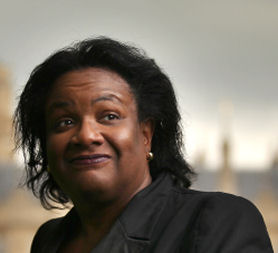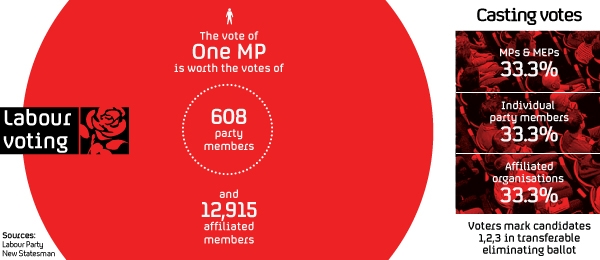Labour race: Abbott steals show as Milibands do battle
As David Miliband fights his brother Ed, Political Editor Gary Gibbon explains the story behind the rivalry and how the first female black candidate could throw a spanner in the voting arithmetic.

David Miliband stood firm against his brother at the first hustings event since nominations closed.
“If I thought that Ed would be a better leader of the opposition or prime minister, I’d be running his campaign,” he told the audience made up mostly of Labour supporters.
When asked earlier by Channel 4 News Political Editor Gary Gibbon why he was running against his brother, he responded: “I think that’s a question you’d have to ask to Ed.”
And at the New Statesman event, that duly happened. Ed Miliband said it had been a mistake for Gordon Brown to run unopposed in 2007 and that he welcomed Diane Abbott’s presence on the ballot to help create a broad contest.
David Miliband defended the Iraq war, but said that the “worst thing to happen to Tony Blair was George Bush”.
Ed Milband disagreed with his brother’s assertion that people around the world support Britain’s internationalism rather than focusing on the 2003 war. Iraq had been “profoundly damaging” to Britain, he said.
Abbott, who opposed the Iraq war in parliament, received the biggest cheer of the night when she attacked her rivals on immigration.
David Miliband's frustration with his brother
I just asked David Miliband why both Miliband brothers were running and he said: "I think that's a question you'd have to ask to Ed."
The only glimmer of a frustration that is generally very well hidden. But I am told it is keenly felt.
On the occasions when David Miliband was tempted to topple Gordon Brown it was, I hear, his brother Ed who "begged and begged and begged" him not to try to topple Gordon Brown and to wait for a vacancy. Now there is a vacancy I am told that David Miliband felt pained that his brother decided to join in the contest.
Much could depend on second, third and fourth preferences under the contest rules... assuming, surely correctly, that no one gets enough votes to get more than 50 per cent of the electoral college in the first round, the key thing could be what happens when the eliminated bottom candidates' second preferences get redistributed.
Let's say Diane Abbott came last in first preferences (this is far from certain, by the way - one former minister just told me he thought she might come third), her voters probably wouldn't lend their second preference to the most Blairite candidates, Andy Burnham or David Miliband, but would give a boost to Ed Miliband and Ed Balls.
In the deputy leadership contest of 2007 none of the six candidates got more than 20 per cent in the first round and the second preferences of eliminated candidates were critical to the result. Even if the top candidate, at the moment assumed to be David Miliband, got well into the 20?s or even low 30?s percentage share of the vote, he would likely face a nail-biting few rounds of elimination and redistribution.
In the deputy leadership contest, of course, there was a bit of tactical alliance building where candidates tried to get their supporters to agree a line on mutually supportive second preference swaps.
Ballot papers will go out in September, the NEC Procedure Committee decided this morning. There was a worry that if the ballot papers went out in August many folk would sweep them up with the post-holiday junk mail and accidentally put the lot in the bin.
Read more from Gary Gibbon's blog
MP for Hackney North and Stoke Newington, Abbott, picked up enough nominations earlier to become one of five candidates standing in the contest.
She will be the only woman, the only non-white candidate and the only backbencher to stand in the race to take over from Gordon Brown.
Speaking to Channel 4 News she said: “The important thing was that the party had hundreds of letters and emails from party supporters who were adament they wanted a ballot which was diverse and represented all wings of the party.
“This will be the biggest and most widespread election of any political party or any organisation in this country.”Diane Abbott
“I have a much longer history in the party than any of the other contenders – 23 years as an MP.
“I bring a knowledge of the party at the grassroots that none of the other contenders have.”
Former cabinet ministers David Miliband, his brother Ed, Andy Burnham and Ed Balls also received the necessary minimum of 33 nominations by the lunchtime deadline.
Leftwing MP John McDonnell announced earlier that he was withdrawing from the race, paving the way for Hackney North and Stoke Newington MP Abbott to make it on to the ballot.
The successful candidate will be announced before the start of the Labour party’s annual conference on 25 September. Frontrunner David Miliband was among those nominating Abbott. He tweeted – spelling Abbott’s name wrong – just before 11am: “Gather John McDonnell pulled out. I’m going now to nominate Dianne myself. Encourage others to do the same.”
He congratulated her via the social networking site, again making the spelling error, after the nominations were announced: “Good news re Dianne. Thanks to my supporters who helped put her on ballot. Important day for debate and diversity in [the] party.”
Grassroots view: 'the boys should watch out'
Rupa Huq writes for Channel 4 News: "For too long this race looked like the choice on offer was either a chap with the surname Miliband or a chap with the first name Ed - or even a bloke in the middle of a Venn diagram of both.
"The entry today to the race of both Andy Burnham as the ballot paper's northerner and Diane Abbott, the all-round minority candidate is of course a good thing.
"In retrospect it was a mistake that Gordon Brown was elected unopposed to the leadership.
"As Diane represents many of the things popular with the Labour membership at large, if not always the country, the boys should watch out - she might end up going all the way!"
Rupa Huq is a Labour blogger
Balls and Ed Miliband also used Twitter to congratulate their rivals. Balls tweeted: “Very good news for our party that Diane and Andy are on the ballot”, while Ed Miliband sent out a message saying: “Really pleased Diane is on ballot, means party can have widest poss choice, ready to get out there and debate across country.”
Acting leader of the Labour party Harriet Harman, who nominated Abbott, said: “Over the next few months over four million people will have the chance to help shape Britain’s progressive future by choosing the next leader of the Labour Party.
“This will be the biggest and most widespread election of any political party or any organisation in this country.”

Abbott, Balls and Burnham all got the 33 nominations required to make it on to the ballot; only the Miliband brothers exceeded the minimum.
David Miliband got the most, 81, and Ed Miliband got 63.The leader will chosen by MPs and MEPs, Labour party members and members of affiliated trade unions.
Each group gets a third of the say – so the vote of an individual MP is worth more than the a vote from a party member.